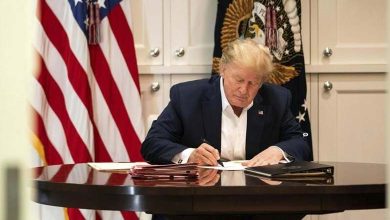“Intransigent” position – Abdul Hamid Dbeibeh still refuses to hand over power

Thirty-six days after the government of Fathi Bashagha was given confidence, his predecessor, Abdul Hamid Dbeibeh, still refuses to hand over power, flouting the decisions of Libya’s parliament.
The intransigent position of former Libyan Prime Minister Abdul Hamid Dbeibeh is gradually crumbling on the rock of Bashagha’s insistence on peaceful entry into Tripoli, in addition to the latter’s economic blockade following the freezing of oil revenues.
In an attempt to resolve Dbeibeh’s rejection of the transfer of power, Yusuf al-Akouri, chairman of the Foreign Affairs Committee in the Council of Representatives, appealed to the European Union to play a positive role in urging it to respect the rules of democracy and the decision of the Council of Representatives.
Dbeibeh failed
Speaking during a virtual meeting with the head of the European Union Mission to Libya, Sabadell Jose, Al-Akouri said that Dbeibeh refuses to hand over power despite the fact that his government failed to fulfill its most important task, which is organizing elections. He expressed his hopes that the European Union will have a positive role in urging it to respect the rules of democracy and the decision of the House of Representatives.
Jose also reiterated the EU’s commitment to working with the House of Representatives and supporting Libya’s stability. He also reiterated his rejection of all solutions that call for violence and his commitment to holding elections as soon as possible, according to a statement issued by the Libyan parliament.
Regarding the role of the European Union in resolving the crisis of the two governments in Libya, Libyan political analyst Kamel Al Maraash said that the European Union has lost any influence in the Libyan crisis, and has become dependent on what he described as American hegemony.
American position
The Libyan analyst explained that whoever requests the intervention of the European Union did not read the scene correctly, pointing out that the European Union will match the US position in no hurry to end the Libyan crisis and return the country to stability.
The Libyan analyst accused the United States of playing with the settlement file in Libya and obstructing any Libyan-Libyan effort to achieve the settlement, pointing out that Washington is offering an alternative to managing the crisis and then managing oil resources for a period of 10 years.
Systematic violence
On the impact of the armed militia clashes the day before yesterday in the capital Tripoli and their impact on the crisis of the two governments, the Libyan analyst said that they continue to control the western region, pointing out that the government of Dbeibeh, which refuses to hand over power, cannot do anything to stop this systematic violence in Tripoli.
Dbeibeh does not even want to intervene to stop these clashes, fearing that it would lose a wrestler in its battle with the new legitimate government, al-Maraash said, adding that he would just pour money on the warlords to stop the clash.
Western will
Libyan political analyst Ezzedine Aqeel said that everything in Libya since the events of 2011 depends on the will and interests of foreigners, noting that a number of internal leaders are mere pawns run by the strings of those parties.
Asked whether asking the European Parliament to intervene means that peaceful solutions have strayed, the Libyan analyst said that there is no such thing as peaceful solutions; The West practices hypocrisy and maintains the two governments, while seeking a constitutional basis that removes them together, he said.












